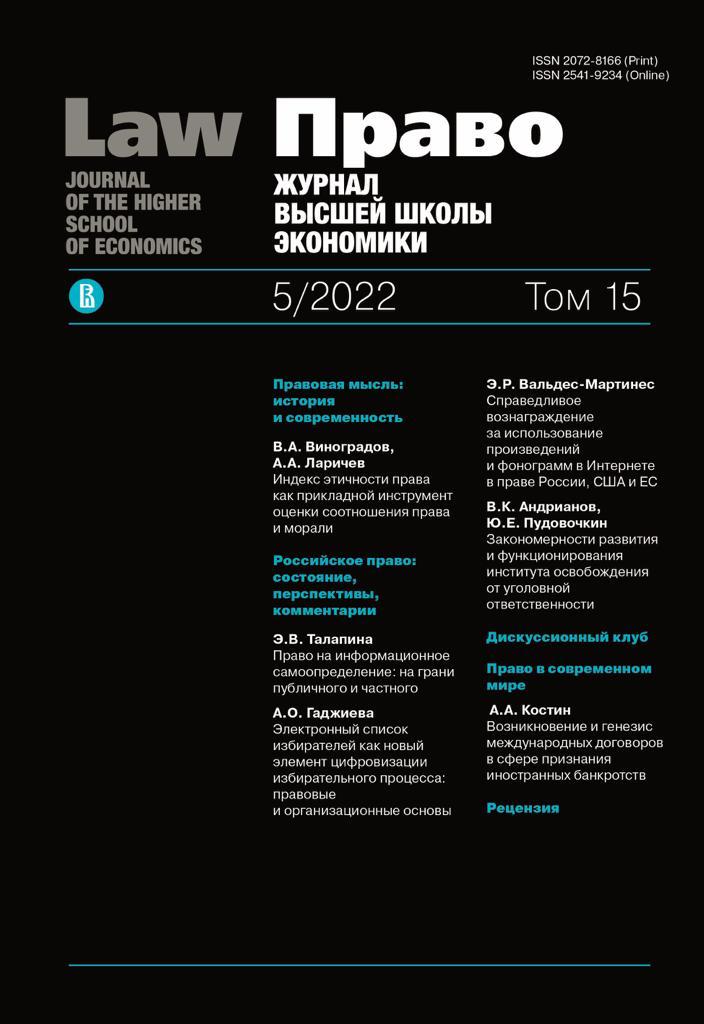The Index of Ethicality of the Law as an Applied Tool for Assessing the Correlation between Law and Morality
Abstract
The paper, first of all, contains a theoretical analysis of the relationship between law and morality as the two most important regulators of social relations is carried out. An analysis is given of both natural law and positivist approaches to the relationship between law and morality in the works of domestic and foreign legal scholars. According to the authors, despite the long history of the formation of relevant theoretical concepts, the development of a structured idea of the relationship between ethics and law in various areas of social relations remains relevant. Both the basic model of the relationship between the two regulatory systems and special models of their relationship and mutual influence in specific areas of society, which determine the fairness and effectiveness of regulation in the context of conjugation of ethics, law, economic and social development, need to be defined. The practical result of the development of such a model is the creation of an index of ethicality of the law, and related indicators. The index of ethicality of the law is a digital product, a machine algorithm built on the principles of learning neural networks. The article describes the phases and content of the work on creating the index as part of the HSE research project, and draws attention to the theory of moral foundations, which forms the basis for the development of related tools. Comparison of the norms of legal acts or their drafts with moral norms and principles relevant to society, of course, requires a reliable picture of the content of the latter. The identification, by means of sociological methods, of the content of moral grounds as the basic criteria for the moral assessment of human behavior will make it possible to compare the ethical ideas of modern Russian society with the content of legal norms that have an ethical load. The index as product can be equally useful both in the legal regulation of social relations through the adoption of legal acts, and in their interpretation and application (including judicial). The authors are convinced that the formation of a social, industrial, cultural and business environment in which it would be comfortable for a person to live, work and pass on his life experience to a new generation requires a systematic reconciliation and correlation with each other of the two systems of social regulation. Such reconciliation can be carried out, among other things, with the help of the latest technologies available to mankind.References
Arkhipov S.I. (2015) Legal theories of Robert Alexi and Lon Fuller. Rossiyskiy juridicheskiyzhurnal = Russian Law Journal, no. 6, pp. 5-15 (in Russ.)
Bentam I. (1998) Introduction to foundations of morality and legislation. Moscow: ROSSPEN, 415 p. (in Russ.)
Bix B. (2009) On philosophy in American law: analytical legal philosophy. In: On Philosophy in American Law. F. Mootz (ed.). Cambridge: University Press, pp. 99-105. DOI: https://doi.org/10.1017/CBO9780511576386.013
Bulygin E.V. (2009) Aleksi's thesis on the necessary connection between law and morality. Rossiyskiy ezhegodnik teorii i prava = Russian Yearbook of Theory of Law, no. 2, pp. 38-41 (in Russ.)
Chernyavsky A.G. (2020) Law as a minimum of morality. Obrazovanie i pravo = Education and Law, no. 3, pp. 53-57 (in Russ.)
Frank S. (1993) Property and socialism. In: Russian philosophy of property 17-20th centuries. K. Isupov, I.Savkin (eds.). Saint Petersburg: Ganza, pp. 309-330 (in Russ.)
Goodfellow I., Bengio Y., Courville A. (2016) Deep learning. Cambridge: MIT Press, 800 p.
Graham J. et al. (2011) Mapping the moral domain. Journal of Personality and Social Psychology, vol. 2, pp. 366-385. DOI: https://doi.org/10.1037/a0021847
Haidt J., Bjorklund F. (2008) Social intuitionists answer six questions about moral psychology. In: Moral psychology. Vol. 2. The cognitive science of morality: intuition and diversity. W. Sinnott-Armstrong (ed.). Cambridge: MIT Press, pp. 181-217.
Kelsen H. (2015) Pure theory of law. Saint Petersburg: Alef-Press, 542 p. (in Russ.)
Khart G. (2007) The concept of law. Saint Petersburg: University, 302 p. (in Russ.)
Mill J. St. (2013) Utilitarianism. Rostov: Don Publishers, 240 p. (in Russ.)
Novgorodtsev P.I. (1995) Law and morality. Jurisprudentcia = Jurisprudence, no. 6, pp. 103-113 (in Russ.)
Raz J. (1980) The concept of a legal system. An introduction to the theory of legal system. Oxford: University Press, 241 p. DOI: https://doi.org/10.1093/acprof:oso/9780198253631.001.0001
Raz J. (1988) The morality of freedom. Oxford: Clarendon Press, 448 p. DOI: https://doi.org/10.1093/0198248075.001.0001
Shershenevich G.F. (1897) Regarding V.S. Solovyov's book “Justification of the Good”. Voprocy filosofii i psikhologii = Questions of Philosophy and Psychology, vol. 38, no. 8, pp. 456-475 (in Russ.)
Smirnova O.V., Kononov A.A. (2021) The distinction between law and morality in legal positivism: a socio-philosophical aspect. Gumanitarnyi vektor = Humanitarian Vector, vol. 16, no. 15, pp. 59-68 (in Russ.) DOI: https://doi.org/10.21209/1996-7853-2021-16-5-59-68
Solovyov V.S. (1988) Justification of the Good. In: Essays. Vol. 1. Moscow: Mysl, pp. 47-548 (in Russ.)
Sychev O.A., Protasova I.N., Belousov K.I. (2018) Diagnostics of moral grounds: approbation of the Russian-language version of the MFQ. Rossiyskiy psikhologicheskiy zhurnal = Russian Journal of Psychology, vol. 15, no. 3, pp. 88-115 (in Russ.) DOI: https://doi.org/10.21702/rpj.2018.3.5
Zaikin V.A. (2017) Moral functioning: a socio-psychological approach. Social-intuitionist theory of J. Haidt. Natcionalnyi psikhologicheskiy zhurnal = National Psychological Journal, no. 1, pp. 32-38 (in Russ.) DOI: https://doi.org/10.11621/npj.2017.0104
Copyright (c) 2022 Law Journal of the Higher School of Economics

This work is licensed under a Creative Commons Attribution-ShareAlike 4.0 International License.





